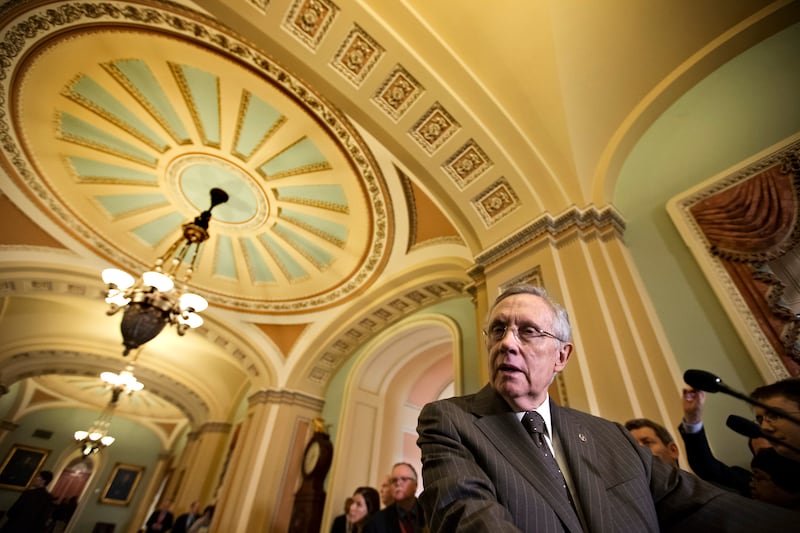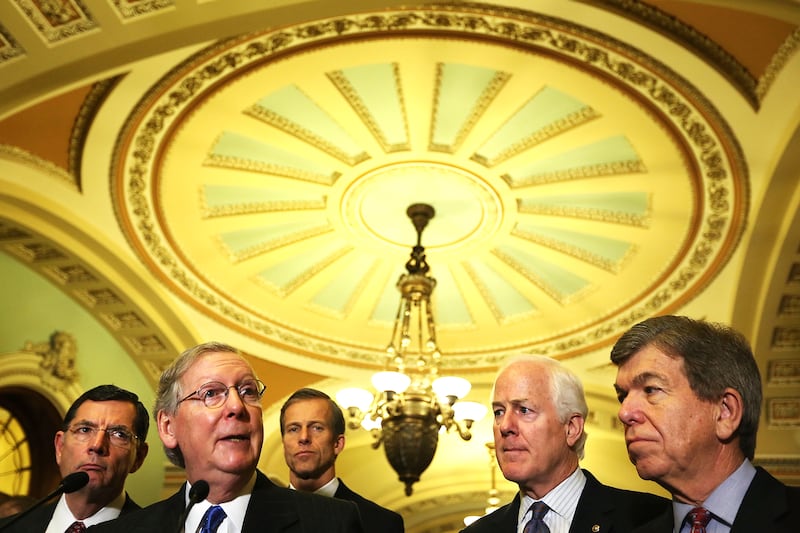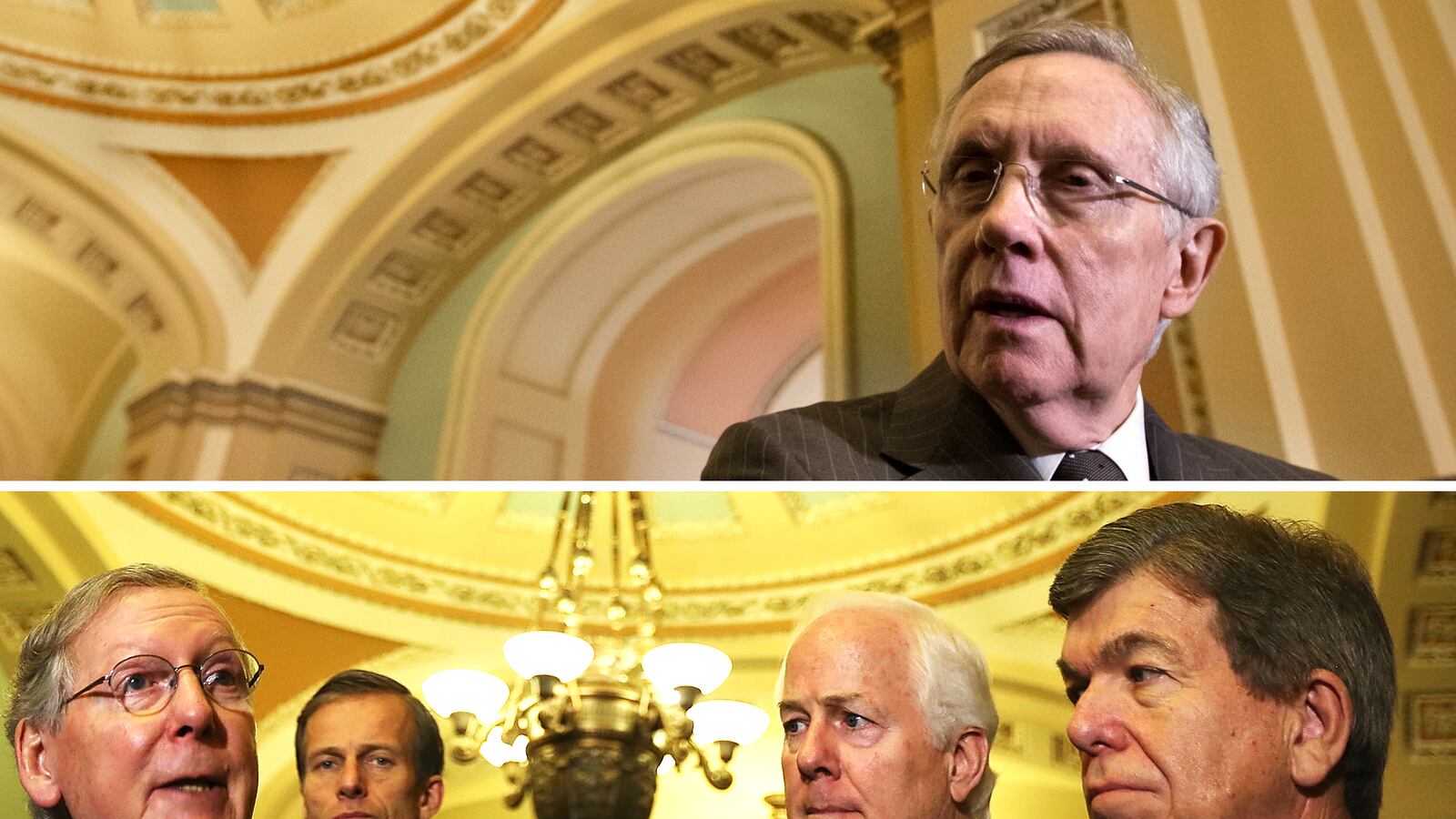As Washington remains convulsed by negotiations over the fiscal cliff, there’s another set of high-stakes talks going on simultaneously, on something that could have even more far-reaching consequences than the debate over taxes and spending: the filibuster.

Sources in the Senate say that in fact the debate over, well, the rules of debate is taking up far more oxygen than the fiscal-cliff negotiations, since over the last several days the financial talks have been reduced to the White House and House Speaker John Boehner trading insults and accusations. The issue of filibuster reform, meanwhile, is quickly approaching a high-wire game of chicken, with Senate Majority Leader Harry Reid promising to push ahead with rules that would limit the minority’s ability to obstruct lawmaking.
At issue is whether Reid will push a series of measures on the first day of the new session next year with a 51-vote majority, or if he will instead try to bring enough Republicans on board so the rules pass with a two-thirds vote. Traditionally, the latter way is how Senate rules get modified, but since each new Senate reaffirms its own internal processes at the start of each two-year term—a non-controversial process that often is approved unanimously—backers of reforms say they have a small window to vote for new rules by a simple majority.
“The frustration within the caucus is real and [palpable] and has been building over time,” said Jim Manley, a former longtime aide to Reid. “Senator Reid is there as well. He shares their frustration. The only question is whether he is going to take up the so-called ‘nuclear option’ or is he going to do it by the 67-vote standard.”
Democrats, in a clever bit of branding, have been calling this “the Constitutional Option,” since the right of each Senate to make up its own rules is enshrined in the nation’s founding document.
Old lions of the Senate on either side of the aisle fret that if Reid proceeds, it will rip asunder the genteel traditions of the upper chamber, and, what’s worse, open the floodgates for slender majorities to upend the rules of the body every time a new majority is sworn in.
Senate Minority Leader Mitch McConnell has been apoplectic at the prospect of “the Constitutional Option,” taking to the Senate floor to decry what he termed “a naked power grab” by the Democrats and reminding them of their own objections to filibuster reform in 205, the last time they were in the minority. At that time, a group of senators known as “The Gang of Fourteen” beat back GOP efforts to end the filibuster for judicial nominees. Top Senate aides say it is not an act—behind closed doors, they say, McConnell has seemed as energized by this issue as any he has faced as minority leader.
This effort is different, however, in a number of respects. For one, the attempt to end the filibuster over judicial nominees wasn’t timed to the beginning of a session; for another, the Senate has grown far more dysfunctional since then.
There have been nearly as many filibusters in the previous six years as there were in the nearly 70 years after 1917, when the senate adopted a 67-vote rule to end a filibuster (it was lowered to 60 in 1970.) And the reforms being discussed are fairly modest. First, they would require that senators actually show up to filibuster in the grand, Mr. Smith tradition, cots and pizza included, rather than the current practice that permits them to essentially raise their hand, and then jaunt off to a fundraiser or head home for the weekend. Other measures would limit the amount of time senators could delay votes on nominations to judicial and administration posts, and prohibit the use of the filibuster on procedural matters. The minority, however, would still retain the ability to keep a bill from passage even if it had the support of 50-plus-one lawmakers.
“These are discrete, incremental changes that will make the Senate more efficient,” said one top Senate aide pushing the bill. “This is not the earth-shattering proposal the Republicans are making it out to be. All of the changes would fundamentally uphold the right of the minority and would require 60 votes to pass anything.”
Which raises the questions—is it enough to reform a body that has been unfavorably compared to the House of Lords?

“No,” replied Larry Cohen, president of the Communications Workers of America, which is part of a “Fix the Senate Now” coalition that includes good-government and progressive groups. “But this is what can get done. At least the American people will see a debate. We are entitled to a debate. We are entitled to make people talk.”
Cohen said the powerful CWA decided to get involved after the 2009-2011 congressional session—when Democrats controlled both chambers.
“We had enormous majorities. A great Congress. The best speaker ever, Nancy Pelosi—that’s what we call her. And Pelosi and the Congress passed 435 pieces of legislation that never got discussed in the Senate for a second,” he said, citing the Employee Free Choice Act, the DREAM Act, a “real fiscal stimulus” and “real health-care reform” as measures that the Senate, with its 60-vote threshold, killed.
The CWA is planning a full-scale lobby day next Wednesday, Cohen said, in an effort to twist the arms of recalcitrant lawmakers.
Cohen and many senior Democrats aren’t dissuaded by the argument of some of the longtime senators of their party, such as Carl Levin and Dianne Feinstein, who point out that it is important to keep the 67-vote tradition for changing Senate rules, since one day Democrats will find themselves in the minority, too. Change the rules to a 51-vote margin, and that will be a green light for every Senate majority from here on out to do as it wishes, they argue.
“Is there any doubt that if McConnell were in charge, that he would change the rules much more drastically than this, regardless of what we do now?” asked one top Democratic aide.
Democratic aides say they have at least 49, and possibly as many as 52 votes to pass the new rules. Passage would require only 50, since the White House has signaled that Vice President Joe Biden could serve as the tie-breaker. But it remains to be seen if Reid actually is committed to ramming through new rules with a more slender majority.
“Right now, the entire issue is in Reid’s head,” said one aide.
For McConnell, the stakes are high as well. Some Republicans have been urging him to sign on to the rules reform, or at least negotiate, since the GOP was tarred this election cycle with being “the party of no.” Democrats have signaled that they will not budge on the requirement that Senators be physically present when they filibuster, and strategists doubt the other parliamentary measures are worth much negotiating. Hill insiders suggest that McConnell may try to push for a measure that would make it easier to add amendments to existing bills, something good- government groups have pushed for as well.
But there is equal incentive for McConnell to let Reid and the Democrats push the rules through on their own. Doing so would give the Democrats full ownership of the new rules and the process, and allow Republicans to say, whenever they regain the upper hand, that they are simply fulfilling the prerogative of the majority—when they too make changes.
Complicating matters further is the fear among some on the left that any deal with Republicans could only water down what has been the best chance in years to turn the Senate into the kind of place that actually can solve the nation’s problems.
“They could dress up a deal,” said Cohen, the union head. “They will not get Republican votes on this unless it is worthless. I am hopeful they will go through with it anyway.”





